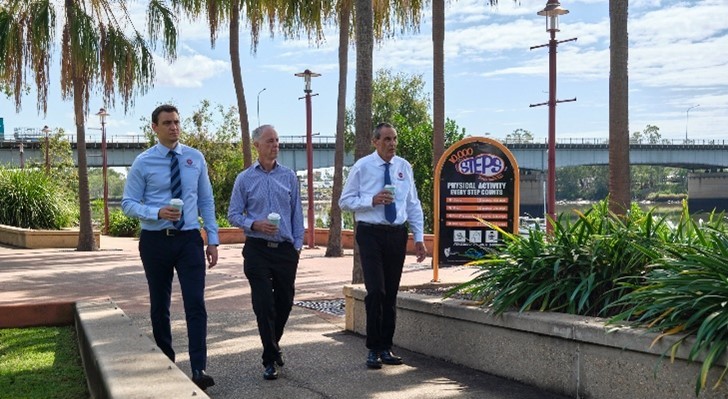Over 550,000 members and 285 billion steps later: Understanding the long-term implementation achievements of a community-wide eHealth intervention program.
Like many countries globally Australia faces an inactivity crisis, with less than half the population meeting the National Physical Activity Recommendations. In 2001 the Queensland State Government responded by funding a 2-year research project looking at the effectiveness of a whole-of-community multi-strategy physical activity intervention: the 10,000 Steps program. The program’s fundamental Behavior change aspects are goal setting (10,000 steps per day) and self-monitoring through the use of a pedometer or activity tracker. During the research project the physical activity levels of Rockhampton (intervention city) significantly increased compared to those in Mackay (control city).
The positive outcomes of the research project and the large popularity of the program prompted the state government to provide new funds for the statewide dissemination of the program. The scope and scale required meant that the program needed transformation. It went from a whole-of-community approach to an e- and mHealth approach solely delivered via website and smartphone apps and linking with commercially available activity trackers.
As of November 2021, the 10,000 Steps program has registered over 550,000 members who have logged 285 billion steps. This equates to around 43 million steps a day! More than 17,000 workplaces and community organisations have been involved with delivering the program. The ‘Workplace Challenge’ has been used by ~65% of registered members and has shown physical activity increases of 159 min per week on average for participants (data submitted to funders).

Workplace participants taking steps at Riverbank in Rockhampton, Australia. Photo provided by 10,000 Steps Australia.
In 2011, the Queensland Government designated the 10,000 Steps program their flagship workplace health promotion strategy. This backing and recognition stimulated additional uptake of the program. The program has received continuous funding from the Queensland Government for more than 20 years; and more recently (2021) the South Australian Government has also started to fund the implementation of the program. Since the outbreak of COVID-19, and driven by repeated lockdowns, engagement with the program quadrupled with over 60,000 new members registered in 2020.

The concept of the Australian 10,000 Steps program has been replicated by governments and commercial providers around the world. Though, a lot still can be learned about its implementation success. The COVID-19 pandemic has further shown the importance of online and remote physical activity programs. The hallmarks of success for the 10,000 Steps program is demonstrated through engaging large numbers of participants to become more active, high population awareness (up to 70% nationwide) and maintaining continuous government funding for over 20 years. This can be attributed to a number of factors (read more about this here):
- The program’s message is simple and clear and offers a prescriptive target for the physical activity ‘dose’.
- Effective use of Behavior change techniques (i.e., goal setting, self-monitoring, gamification and social support).
- Consistent use of marketing strategies to develop project name, logo, style guides, merchandise, and branding.
- Ongoing redevelopment to stay up-to-date with new technology (i.e., web, apps, trackers).
- Dedicated resource and staff to support implementation, networking, collaboration, promotion, and dissemination.
- Continuous evaluation interwoven with the implementation to increase understanding which parts of the program need improvement.
- Careful funder and stakeholder management and alignment with strategic plans. Many partnerships across health and non-health sectors are also needed to promote the project, its brand, and it message.
The longevity of this program addresses several of the ISPAH #8investments. 10,000 Steps is promoted via social media and the program integrates all levels of the social ecological model to ensure a community-wide impact. Few researcher-developed and -implemented physical activity promotion programs have been able to rely on continuous government support for over 20 years and achieve high levels of implementation. Given the ongoing struggle to sustainably implement many evidence-based physical activity interventions at scale, there is a need to communicate the firsthand experiences of implementing the 10,000 Steps program, so that it may support the implementation of other programs.
Take home messages from 10,000 Steps program in Australia:
- Sustained and effective implementation of physical activity promotion programs is only partially driven by the evidence of effectiveness for the program.
- Just a good website/app is not sufficient for sustained success, the importance of partnerships, collaborations, project staff and ongoing promotion cannot be underestimated.
- Don’t underestimate the importance of good marketing and branding.
- There is a constant need to evolve and reinvigorate the program as circumstances change.
Authors
Prof Corneel Vandelanotte, Central Queensland University, Australia
Ms Anetta Van Itallie, Central Queensland University, Australia
Prof Wendy Brown, University of Queensland, Australia
Prof Kerry Mummery, University of Alberta, Canada
Prof Mitch Duncan, University of Newcastle, Australia
Conflicts of Interest:
Prof Corneel Vandelanotte and Ms Anetta Van Itallie receive funding from Health and Wellbeing Queensland and Wellbeing SA for the onging implementation of the 10,000 Steps program.
Prof Wendy Brown has previously received funding for the development and evaluation of the 10,000 Steps program.
Prof Kerry Mummery has previously received funding for the development, evaluation and implementation of the 10,000 Steps program
Prof Mitch Duncan has previously received funding for the implementation of the 10,000 Steps program.




